When someone passes away, dealing with their home and other property can be complicated, especially if the house is already in foreclosure. In Michigan, many families are surprised to find themselves handling both probate and foreclosure at the same time. It can feel overwhelming, but understanding the process can help protect your loved one’s home and your family’s inheritance.
That’s where Law Office of Julie A Paquette comes in. We’ll walk you through what happens when a home is in foreclosure during the probate process and how our team can support you.
What Is Probate?
In Michigan, probate is the court-supervised legal process that manages a deceased person’s asset. This can include:
- Making sure the will (if there is one) is valid
- Identifying and valuing everything the person owned
- Paying off debts and taxes
- Distributing remaining assets to heirs or beneficiaries
Real estate is often one of the most valuable parts of an estate. But if that home has an unpaid mortgage or is already in foreclosure, it adds a layer of complexity that needs more attention.
What Is Foreclosure?
Foreclosure happens when the homeowner stops making mortgage payments, and the lender takes steps to take back the property. If the person who passed away had missed payments, their home may already be in the foreclosure process.
It’s important to know that the mortgage doesn’t go away when the owner passes. The estate (managed through probate) still owes that debt, and the lender can continue the foreclosure process even while probate is underway.
Why Foreclosure During Probate Can Be a Challenge
The Mortgage Still Needs to Be Paid
Even after death, the mortgage loan doesn’t disappear. Unless payments are made, the lender can move forward with foreclosure.
The Executor Has to Act Quickly
The personal representative (or executor) of the estate is responsible for managing the deceased person’s property. If a home is in foreclosure, they need to take action—whether that’s paying the mortgage, negotiating with the lender, or exploring other legal options.
Foreclosure Can Reduce the Value of the Estate
If a home is lost to foreclosure, it might be sold at a low price through auction. That means less money in the estate, and heirs could receive less than expected.
How Foreclosure Complicates the Probate Process
When foreclosure and probate happen at the same time, things can get more stressful:
- Time pressure: The lender may move faster than the court, creating urgent deadlines.
- Creditor claims: Mortgage lenders are just one of several parties who might have a financial interest in the estate.
- Family disagreements: Emotions can run high, especially if the home has sentimental value or if heirs have different ideas on how to handle it.
What You Can Do: Legal Options to Protect the Property
The good news is that there are ways to deal with foreclosure during probate. Some options include:
- Ask for a delay: An attorney can request more time from the lender or the court to give the estate a chance to respond or catch up on payments.
- Use estate funds to pay the mortgage: If the estate has cash or other liquid assets, those funds can be used to keep up with mortgage payments during probate.
- Plan with a trust: In the future, setting up a living trust can keep the home out of probate entirely and help avoid similar issues after a loved one passes.
Contact Law Office of Julie A. Paquette Today
If you’re facing foreclosure during a probate case in Michigan, you’re not alone. The estate planning attorneys at Law Office of Julie A. Paquette can help guide you to protect the property, manage the estate properly, and support your family during a difficult time.
Contact us today to schedule your free consultation and get the experienced legal support you need to move forward with confidence.



